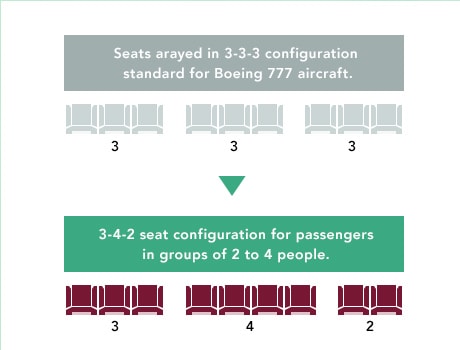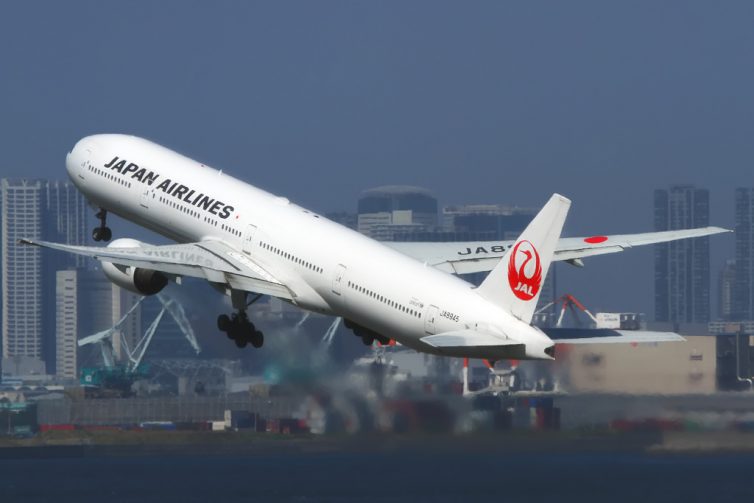Japan Airlines (JAL) announced last week that its newly-revamped Boeing 777-200ERs (772s) dubbed “JAL SKY SUITE 777” or “SS2” will debut on June 18 from Tokyo Haneda (HND) to Bangkok (BKK). Designated for regional flying, the SS2 will feature now-industry standard lie-flat seating in business class, a roomy premium economy section, and best-in-class nine-abreast seating in economy, going against the grain during a time when virtually every new refurbishment of 777s calls for ten-abreast seating.

An illustration of the new economy seating configuration on JAL’s “SS2” Boeing 777-200ER – Image: Japan Airlines
What’s even more eye catching is JAL’s choice to go with an asymmetric 3-4-2 arrangement, while every other carrier uses 3-3-3 (well, when they do have nine across on their older planes). Where new premium seating is all the rage nowadays, JAL manages to remember the little people, and the economy cabin steals the spotlight…

JAL’s new SS2 configuration for its Boeing 777-200ERs – Image: Japan Airlines
While configuring only nine seats across in a new 777 cabin is unusual for the industry, it’s not so unusual for JAL, who put only eight seats across on its 787 Dreamliners, as Boeing engineers had originally intended and in spite of the rest of the 787 operators choosing to cram in nine across (Japanese competitor ANA also originally featured eight-abreast seating on their Dreamliners).
Not only is the seat wider than average at 18.5 inches, JAL also increases seat pitch to a generous 33-34 inches (previously 31 inches) on top of using a thinner seat than previously (though not “slimline”). The modern ergonomic sculpting of the seat back maximizes space right at the knees, and all together creates possibly the roomiest standard economy space in the sky today.

An illustration of the extra leg room of the SKY WIDER economy seat – Photo: Japan Airlines

The JAL SKY WIDER economy seat – Photo: Japan Airlines
JAL completes the economy passenger experience with a 10.6-inch touchscreen with the company’s latest MAGIC-VI system, AC outlets and USB charging ports at every seat, thoughtful storage nets and pockets, and updated LED lighting throughout to improve perceived environment and ambiance. Also can’t forget the mention of in-flight internet access coming with the 772 refurbishment.
BONUS: The Boeing 777: Which Airlines are 9 vs 10 Abreast in Economy?
While the biggest improvement lies in the economy cabin, the new premium economy and business class seats deserve praise as well. The premium economy cabin is set up in a 2-4-2 configuration with 19-inch hardback shell seats. When reclining, the seat cushion slides forward while the seatback tilts. This keeps the seat in front from invading the passenger envelope to the rear, while also providing for a hard wall to grab for support without disturbing the passengers in front.

The new JAL SKY PREMIUM seat. Photo: Japan Airlines

Features of the JAL SKY PREMIUM seat – Photo: Japan Airlines
Screen size goes up to 12.1 inches, there’s a legitimate leg rest, and a privacy divider sits between passengers at head level.
And of course, we can’t ignore the new business class seats. While JAL uses an enclosed business suite on their long-haul aircraft, for this regional configuration the airline is using a more standard reverse herringbone 1-2-1 layout, which still gives all passengers aisle access (a vast improvement over the previous generation 2-3-2 arrangement, meaning passengers on a full flight won’t have to bother, or be bothered by, their neighbor).

The JAL SKY SUITE III to be introduced on JAL’s 777-200ERs – Image: Japan Airlines.

The JAL SKY SUITE, found on JAL’s longhaul 777-300ERs and 787-8s and -9s – Image: Japan Airlines

JAL’s previous SHELL FLAT business class seat – Photo: Japan Airlines
The JAL SKY SUITE III has a 17-inch touchscreen that can also be controlled by remote. For those sitting in the middle section, a retractable privacy divider is available. The 20.5-inch wide seat lies flat into a 78-inch bed.

The new JAL SKY SUITE III reverse herringbone business class seat lies fully flat. Photo: Japan Airlines
JAL has made huge strides since its financial bailout, improving its long-haul international service, cabins, and fleet. Now they are raising the bar on their regional product to match the long-haul effort. While the industry continues to cram in as many passengers as possible, JAL is trying to create a competitive advantage for itself in offering more space to economy passengers, as well as bringing their business and premium economy seats up to long-haul standards. Time will tell if this calculated risk pans out, but no doubt the new SS2 configuration is a winner for passengers.

The business class cabin on the new SS2-configured Boeing 777-200ER. Photo: Japan Airlines

This is a stunningly simple but effective idea. I’ve long since chosen to fly on A330/340 layouts with paired seats each side but these are rapidly being replaced by planes with dreaded 3-3-3 layouts which only suit the few travelling in threes. JAL should be congratulated on this and let’s hope it’s the beginning of a trend!
3-3-3 on A330s/A340s and 787s, 3-4-3 on 777s, and a possible 3-5-3 on the A380… it’s madness, I tell ya!
John | Airline Reporter
A good report, John. I’ve seen/flown the 3-3-3 arrangement on JAL only once and twice on other carrier. It is not horrible, especially if the maintain the 33 – 34 inch pitch. The 3-4-3 truly does make it feel like cattle-class, especially if they cut back on the 33 pitch to add that extra row. I considered one flight that was already configured as 3-4-2, but all of the twosies were long lone. In the end, Nine-Across and 33″ is really the limit even for JAL’s semi-domestic 777 fleet. In the end, their really are limits to the number of bodies that can be crammed into even a custom-built Very Large Airplane, such as the 777s that JAL uses for some of their longer domestic routes. IMO, JAL does a better job of balancing load with revenue than do most other Asian carriers who fly similar routes. I think JAL gets it when they avoid all 4-wide blocks as often as possible; those are hell wnd we all know it. Again, an excellent report, John, and all closely supervised by the now infamous IPA hag in the corner.
What a unique layout, but makes a lot of sense once one thinks about it: families in the middle, couples/companions on the right, everyone else on the left. The only downside I can see is slightly more complicated cabin service, but more carrier ought to consider this.
Japan airlines should be thanked immensely for defying the new norm and showing to passengers that they still care. It’s up to the passengers to vote for them even if they might be slightly expensive if st all. Plus, JAL must widely let the world know about their bold move through ads and promotions.
Congrats to JAL. I will choose them whenever possible. 10-across seating on a 777 is simply miserable (and sounds like 9-across on 787 will be the same). These cattle configurations make it nearly impossible to eat or read (with your elbows stuck to your ribs) and are physically painful. The aisles are so narrow that if you are lucky enough to get an aisle seat, your shoulder will be bumped dozens of times by passengers and crew. Even Emirates uses these awful configurations. I’ve stopped using Air New Zealand (777) from the US and now fly Hawaiian with a stopover to get an acceptable economy seat.